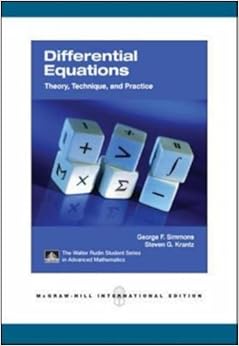My office hour for M2AA1 will be Tuesday 15:00-16:00. My office is 638 Huxley.
Thursday 21 January 2016
Thursday 14 January 2016
Books
There are many books which can be used in conjunction with this module, but none are required. Recommended
books include
– G.F. Simmons and S.G. Krantz, Differential Equa-
tions: Theory, Technique, and Practice. This book
covers a significant amount of the material we cover.
Some students will love this text, others will find it
a bit longwinded.
– R.P Agarwal and D. O’Regan, An introduction to
ordinary differential equations.
– G.Teschl, Ordinary Differential Equations and Dynamical Systems. This book can be downloaded
for free from the authors webpage.
– M.Hirsch,S.Smale and R.L.Devaney, Differential
equations, dynamical systems, and an introduction
to chaos.
– V.I. Arnold, Ordinary differential equations. This
book is an absolute jewel and written by one of the
masters of the subject. It is a bit more advanced
than this course, but if you consider doing a PhD,
then get this one. You will enjoy it.

Additional exercises and lecture notes can be freely down-
loaded from the internet.
Practical Arrangements
Welcome to M2AA1, 2016 session!
-
The lectures for this module will take place Tuesday 11-
12, Thursday 10-11, Friday 11-12 in Clore.
- Each week I will hand out a sheet with problems. It is very important you go through these thoroughly, as these will give the required training for the exam and class tests. Problems will be divided into elementary and more advanced problems that need a bit more of work and thought.
-
Problem classes: Tuesday 12-1 (in 340) and Thursday 11-12 (in 340, 341, 342),
from January 19. The problem classes will be run a
bit differently from previous years. In addition to the
usual problem class with many assistants, there will be
an additional optional one hour session dedicated to the
elementary problems.
-
The Tuesday problem session in room 340 will be used
to explain the elementary problems in detail on the
board. This session will be moderated by Prof Dmitry
Turaev.
-
The Thursday problem session in rooms 340, 341 and
342 has teaching assistants present to help you in small
groups, mainly with the more advanced problems, but
additional questions on the elementary problems and questions concerning the lecture notes can of course also be
addressed.
- The objective is to make sure that students can benefit maximally from the support classes.
- The best way to revise for the tests and the exam is by doing the exercises and study the notes critically and in detail. Exercises are not necessarily like exam or test questions but they have been chosen to help you understand the course material.
- Detailed instructions on how to study and prepare for the exam will be given towards the end of the term.
- There will be two class tests. These will take place on Thursday 11th February and Thursday 10th March. Each of these count for 5%.
- Questions are most welcome, during or after lectures and during the office hour.
- My office hour will in my office 638 Huxley Building, at a time TBA asap.
Subscribe to:
Posts (Atom)